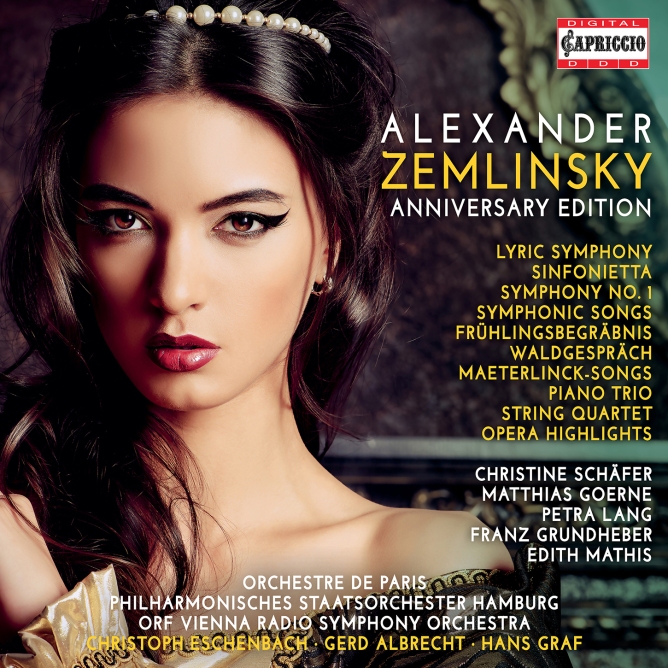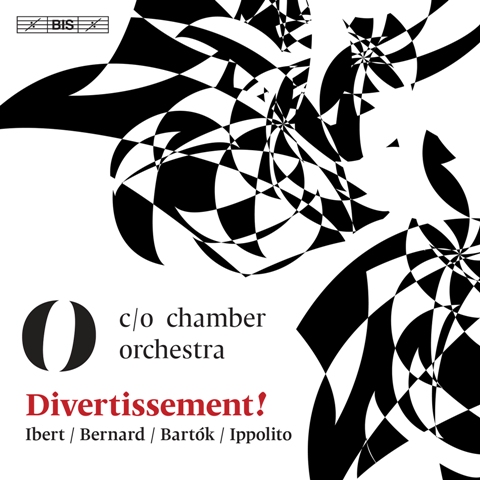
ZEMLINSKY: Lyrische Symphonie / Christine Schäfer, sop; Matthias Goerne, bar; Orchestre de Paris; Christoph Eschenbach, cond / Symphony in D min. / North German Radio Symphony Orch.; Antony Beaumont, cond / Sinfonietta. 6 Songs / Petra Lang, sop; Vienna Radio Symphony Orch.; Susanna Malkki, cond / 3 Ballet Pieces from “Triumph der Zeit.” Symphonische Gesänge / Franz Grundheber, bar; Hamburg State Philharmonic Orch.; Gerd Albrecht, cond / Frühlingsbegräbnis.* Waldgesprach.+ Maiblumen blühten überall+ / *Roland Hermannn, bar; +Edith Mathis, sop; North German Radio Chorus & Symphony Orch.; Antony Beaumont, cond / Walzer-Gesange nach toskanischen Volksliedern / Thomas Michael Allen, ten; Charles Spencer, pno / Irmelin Rose und andere Gesäng. Noch spür ich ihren Atem auf den Wangen. Harmonie des Abends / Ruth Ziesak, sop; Gerold Huber, pno / Es war ein alter König. Waldgespräch / Kay Stiefermann, bar; Alexander Schmalcz, pno / 2 Brettl-Lieder / Thomas Ebenstein, ten; Charles Spencer, pno / 6 Gesänge, Op. 13 (arr. E. Stein & A. Tarkmann for chamber ens) / Zoryana Kushpler, mezzo; Linos Ensemble / Piano Trio in D min. / Pacific Trio / String Quartet No. 2 / Artis Quartet / Es mar einmal (Once Upon a Time) – exc. / Eva Johansson, sop; Kurt Westi, ten; Per-Arne Wahlgren, bar; Danish Nat’l Radio Choir & Symphony Orch.; Hans Graf, cond / Der Traumgörge – exc. / Pamela Coburn, Maria Gabriel Ronge, Birgit Calm, sop; Josef Protschka, Peter Haage, Heinz Kruse, ten; Hartmut Welker, bar; Hessen Radio Youth Choir & Figural Choir; Frankfurt Radio Symphony Orch.; Gerd Albrecht, cond / Der Kreidekreis – exc. / Renate Behle, sop; Peter Matić, ten; Hans Helm, bar; Gidon Saks, bs-bar; Rundfunk-Sinfonie Orchester, Berlin; Stefan Soltesz, cond / Eine florentinische Tragödie, Op. 16 (exc) / Heidi Brunner, sop; Charles Reid, ten; Wolfgang Koch, bar; Vienna Radio Symphony Orch.; Bertrand de Billy, cond / Der König Kandaules, Op. 26 (reconstructed and completed by A. Beaumont) (exc) / Nina Warren, sop; James O’Neal, ten; Monte Pederson, bar; Hamburg State Philharmonic; Gerd Albrecht, cond / Capriccio C7360
Once a major composer lauded by Gustav Mahler (and sexually pursued by his nymphomaniac wife, Alma), Alexander von Zemlinsky has fallen through the cracks of the standard repertoire, but everything I’ve heard by him to date has been highly impressive and most of the music on this set is no exception.
Unfortunately, my download of this album did not come with a booklet so I can’t tell you the range of recording dates involved or what all of the pieces are about, but my hunch is that they were made over a period of years and so were assembled here as an anniversary tribute to the composer (the 150th anniversary of his birth in 1871). I heartily applaud Capriccio for making this move; we get so many Beethoven, Schubert, Schumann, Chopin etc. tributes that it’s about time that someone not in the standard rep gets noticed for a change.
The Lyric Symphony, which takes up the entire first disc, is a splendid piece, one of the few Zemlonsky works that has received multiple recordings. Written in 1922-23, it comes from his fully mature period, built around sung texts from Rabindranath Tagore’s book of poems, The Gardener. Alban Berg liked this music so much that he quoted the third movement in his own Lyric Suite for string quartet. The performance given here is a gold-plated one, not only conducted by Christoph Eschenbach, but the singers are none other than soprano Christine Schäfer and baritone Matthias Goerne, and they are in superb voice—not to mention excellent interpreters who also have crisp, clear diction. And yes, the music sounds very Mahlerian in places (and certainly in scope) without actually aping the older composer too closely. (There are also some overtones of Korngold, but without the heavy amount of treacle that the younger composer poured into his scores by the bucketful.)
The Symphony in D minor, on the other hand, is a very early work, written in 1892-93 when he was only 21-22 years old. Obviously, it is more in the late Romantic vein and less adventurous than the Lyric Symphony, but for the work of a very young man it’s not bad—although, to be honest, it doesn’t show much originality. I’d say that this is one piece that’s for Zemlinsky completists only. Next up are the Sinfonietta and three pieces from the ballet Triumph der Zeit, both mature works (composed in 1934 and 1902 respectively. The first is, of course, a fully mature work, premiered in Prague in 1935, while the latter comes from 1902. Though in a more Romantic vein, the ballet pieces aren’t too bad.
CD 3 consists of vocal works with orchestra, all featuring first-class singers and excellent conducting. Several of these sound like a cross between Brahms and early Mahler although, tobe honest, the group titled Frühlingsbegräbnis sounded pompous and overblown, not to my taste at all. Waldgesprach and Maiblumen blühten überall were considerably better but, unfortunately, Edith Mathis was past her sell-by date when she recorded them. I recommend the performance of the former by Sandrine Piau and the latter by Gabriella Sborgi with Alessandro Maria Carnelli and the Sextet of the Orchestra da Camera di Mantovani instead. Happily, the superb Symphonische Gesänge (1929) are sung by the excellent baritone Franz Grundheber, with highly atmospheric conducting by Gerd Albrecht. Petra Lang, despite having a somewhat acidic timbre, does a fine job on the 6 Gesange with Susanna Malkki conducting.
More songs fill CD 4, these with piano accompaniment. The Walzer-Gesange remind one of Schubert or Brahms and are sung with a lovely, caressing tone by tenor Thomas Michael Allen. Soprano Ruth Ziesak does an equally fine job on Irmelin Rose und andere Gesäng and Noch spür ich ihren Atem auf den Wangen. Baritone Kay Stiefermann, who sings both Es war ein alter König and Waldgespräch, doesn’t have much of a voice but what he has is pleasant, he’s a fine interpreter, and again, his diction is crystal-clear.
The fifth CD presents Zemlinsky’s chamber works, the early Piano Trio which is one of his most popular works and the somewhat early Strung Quartet No. 2 (1913-15). Both are in his Romantic style but are interesting, well-crafted works, the former somewhat resembling the music of Dvořák and the latter including some of the more modern harmonies that would dominate his later music. The first is performed excellently by the Pacific Trio, nearly as good as the recording by Trio Voce on the Con Brio label, while the quartet is played with incredible intensity by the Artis Quartet. This is truly one of Zemlinsky’s masterpieces. Interestingly, at the three-minute mark in the first movement I heard a brief quote from Strauss’ Don Quixote.
The final CD contains excerpts from four of Zemlinsky’s operas: Es mar einmal (Once Upon a Time), Der Traumgörge, Der Kreidekreis, Eine florentinische Tragödie and his last, ill-fated opera, Der König Kandaules. I am pretty much against excerpting operas, particularly integrated works like these that do not lend themselves well to such a treatment; it’s like presenting excerpts of Strauss’ Elektra and Berg’s Wozzeck without you knowing the operas complete or how the music fits into the whole. Besides which, neither Elektra nor Wozzeck lend themselves well to excerpting in the first place, and neither do these operas. I will be reviewing the reissues of the complete Eine florentinische Tragödie and Der König Kandaules in a future review, but to summarize what is heard here the singing is mostly superb, including such well-known artists as Eva Johansson, Pamela Coburn, Josef Protschka, Renate Behle and Hans Helm. I think the reason Capriccio chose to include excerpts from those first two operas listed is that the music is tuneful and cheery, sometimes using Viennese waltz rhythm and therefore appealing to the average low-information classical listener. The music is, for the most part, a grade or two above Korngold or Lehár, but it’s still very much in the same vein. The last two operas have darker, meatier music which will appeal to the discerning listener but not to those who start humming along with the tunes from Der Traumgörge.
To sum this set up, it’s an excellent introduction to Zemlinsky’s musical world despite the weakness of the Symphony in D minor and the two defective singers mentioned above in the songs. For the surprisingly reasonable price of $32.75 (at Presto Classical) or $28.99 (at FYE, even lower at $23.75 at HB Direct), it’s well worth your investment. I would, however, also recommend that you acquire the two complete operas that Capriccio has reissued as well as the composer’s String Quartets Nos. 3 & 4 and the very fine orchestral tone poem Die Seejungfrau (The Young Mermaid) for a bit more perspective on this fascinating and too-often-neglected composer.
—© 2021 Lynn René Bayley
Follow me on Twitter (@Artmusiclounge) or Facebook (as Monique Musique)
Return to homepage OR
Read The Penguin’s Girlfriend’s Guide to Classical Music








 ÅSTRAND: Nine Steps. Ten Steps. Seven Steps. Meditation Moment. August. Pitter Patter. Ice Sculpture. Anne / Miles Osland, s-sax/a-sax/pic/C-fl/a-fl/bs-fl; Anders Åstrand, vib/marimba / Mark Masters 55969-MCD
ÅSTRAND: Nine Steps. Ten Steps. Seven Steps. Meditation Moment. August. Pitter Patter. Ice Sculpture. Anne / Miles Osland, s-sax/a-sax/pic/C-fl/a-fl/bs-fl; Anders Åstrand, vib/marimba / Mark Masters 55969-MCD

